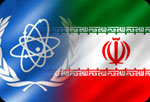 AFP: The UN atomic agency resumes talks in Tehran on Saturday to tackle allegations of past Iranian weapons work and discuss more practical steps to increase the transparency of the country’s nuclear drive.
AFP: The UN atomic agency resumes talks in Tehran on Saturday to tackle allegations of past Iranian weapons work and discuss more practical steps to increase the transparency of the country’s nuclear drive.
By Mohammad Davari

Tehran (AFP)— The UN atomic agency resumes talks in Tehran on Saturday to tackle allegations of past Iranian weapons work and discuss more practical steps to increase the transparency of the country’s nuclear drive.
The one-day encounter between Iran and the Vienna-based International Atomic Energy Agency will build on a framework deal agreed in November that required Tehran to take six practical steps by next Tuesday.
With completion of those measures — including a visit to the heavy water plant at the unfinished Arak reactor — negotiations on “more difficult things” are expected to begin, IAEA chief Yukiya Amano has said.
Iranian Atomic Energy Organisation spokesman Behrouz Kamalvandi has said that, based on the IAEA’s assessment of progress, the scope of future cooperation will be decided.
He expressed hope that “the agency’s doubts have been removed.”
Led by chief inspector Tero Varjoranta, the IAEA team is to meet Iranian nuclear officials, led by Iran’s IAEA envoy, Reza Najafi.
Kamalvandi said the talks could be extended if there is major progress.
The six-step November deal was struck after two years and nearly a dozen rounds of talks. It is separate to the landmark nuclear agreement also reached in November with world powers that put temporary curbs on nuclear activities.
Implementation began on December 8 when IAEA inspectors visited Arak, whose small, unfinished heavy water reactor has been hit by a series of delays.
The site, which Iran insists is an integral part of its nuclear programme, is of international concern because Tehran could theoretically extract weapons-grade plutonium from its spent fuel if it also builds a reprocessing facility.
But Iranian atomic chief Ali Akbar Salehi said earlier this week the reactor could be modified to produce less plutonium in order to “allay the worries.”
And he insisted that Iran did not intend to build a reprocessing plant.
Iran’s nuclear activities have been in the international spotlight for the past decade over suspicions in the West and Israel that they mask military objectives, despite repeated Iranian denials.
The IAEA is focusing on Tehran’s past work to clear long-standing allegations that, prior to 2003, and possibly since, Iran’s nuclear drive had “possible military dimensions.”
Rejecting those allegations as baseless, Iran denies that is seeking now or has ever sought nuclear weapons.
IAEA director general Amano told AFP in an exclusive interview last month that it was now the time to ask the “more difficult” questions and push Iran on those issues.
“We started with measures that are practical and easy to implement, and then we move on to more difficult things,” said Amano. “We certainly wish to include issues with ‘possible military dimensions’ in future steps.”
How long this takes “very much depends on Iran. It can be quick or it can be long. It really depends on their cooperation.”
The IAEA has been asking Iran in vain for years to grant inspectors access to the Parchin military facility where it suspects Tehran may have experimented with atomic weapons development.
The IAEA talks are running in parallel with diplomatic efforts by the so-called P5+1 group of world powers negotiating for a comprehensive accord with Iran that would once and for all resolve the impasse over its nuclear work.
Answering the IAEA’s questions are a key demand of world powers — the United States, Russia, China, Britain, France as well as Germany — in that process.
Under an interim deal with the P5+1 agreed on November 24, Iran has stopped enriching uranium to medium levels and is converting its current stockpile into a form much more difficult to process into weapons-grade material.
In exchange, Tehran has received limited relief from punishing sanctions imposed on it.
Verification of those measures is delegated to the IAEA, forcing the agency to double the number of its inspectors and increase the frequency of visits to Iran’s nuclear facilities.


